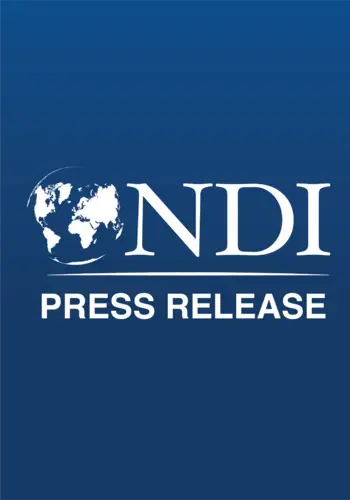TBILISI – Poll results released today by the National Democratic Institute (NDI) and CRRC-Georgia show strong support for membership in the European Union (EU) and NATO. A total of 77 percent approve joining the EU, with 56 percent strongly approving. If the country held a referendum on membership tomorrow, 68 percent would vote for and only 14 percent against. Those who support EU membership identify economic growth, security, and jobs as the primary reasons for their approval. Of the 13 percent who disapprove EU membership, 39 percent cite conflict with Russia, 31 percent the desire for closer ties with Russia, and 19 percent the belief that the EU threatens Georgian culture as the top three reasons for disapproval. In fact, 41 percent of all Georgians, regardless of position on EU membership, believe the EU threatens Georgian values.
A majority of Georgians also believes that joining the EU would benefit many groups in the country, including farmers, students, persons who are unemployed, and ethnic, religious, and sexual minorities, and improve the quality of education, affordability of healthcare, and Georgia’s security, among other issues.
Support for NATO membership also stands steadily at 74 percent, with 55 percent of citizens strongly approving membership. However, in Armenian settlements, half (49 percent) the population disapproves of membership and only 28 percent approve. While support for NATO membership is also low in Azeri settlements, it is not due to disapproval but rather very high “don’t know” responses, at 41 percent.
Georgians view membership in NATO and the EU as top guarantors for the country’s national security at 28 percent and 11 percent, respectively, in addition to a strong leader (11 percent) and strengthening the country’s own defense capabilities (9 percent). A majority of Georgians believes Russia is a top security threat to the country, with 31 percent naming Russian military aggression, 11 percent occupation, and 10 percent Russian propaganda. This was less true, however, in Armenian and Azeri settlements, where only three percent and eight percent, respectively, view Russian military aggression as a threat. Pluralities also believe Russia has a negative impact on the economy (43 percent), politics (45 percent), and security (47 percent).
Despite support for membership, the majority of Georgians does not believe the country is ready for EU membership (59 percent) or NATO membership (55 percent). The factors holding Georgia back from EU membership are territorial conflicts (36 percent), Russia (20 percent), and lack of democracy (15 percent). Similar reasons were given for delays in NATO membership. Respondents listed the occupied territories (42 percent), Russia (47 percent), and lack of democracy (12 percent).
“While EU support is still very strong in Georgia, it’s important to be mindful of the widespread belief that the Union poses a threat to Georgian culture and values. Those who want to deepen domestic support for the EU need to better explain membership and its goals,” said Laura Thornton, NDI Global Associate. “With regard to NATO, it is interesting to learn how differently this issue is perceived in Armenian and Azeri settlements. While Armenians actively disapprove of membership, people in Azeri settlements clearly lack adequate information. Different approaches are therefore required when communicating in these areas, and more needs to be done to reach Azeri communities.”
NDI surveys public opinion to help Georgian stakeholders diagnose and address issues of public concern by providing accurate, unbiased and statistically-sound data. This poll aims to capture the most relevant information to foster the development of responsive policies and governance. A wide range of leaders from across the political spectrum have reported that the polls are important to their work and encourage continued polling. The results reflect data collected from March 28 to April 15, 2019, through face-toface interviews with a nationwide representative sample of Georgia’s adult population (excluding occupied territories), including oversamples in Azeri and Armenian ethnic minority settlements. This included 2,927 completed interviews. The average margin of error was +/- 2.3 percent.
NDI’s survey work is funded by UK aid from the British people.
This poll was carried out by CRRC Georgia.
###
NDI is an independent, nonprofit, nonpartisan organization working to support and strengthen democratic institutions worldwide through citizen participation, openness and accountability in government. More information is available at www.ndi.org.
CRRC-Georgia is a non-governmental, non-profit research organization with a mission to promote evidence based debates on policy issues by providing reliable, up-to-date and accessible data and analysis. More information is available at http://www.crrc.ge.

